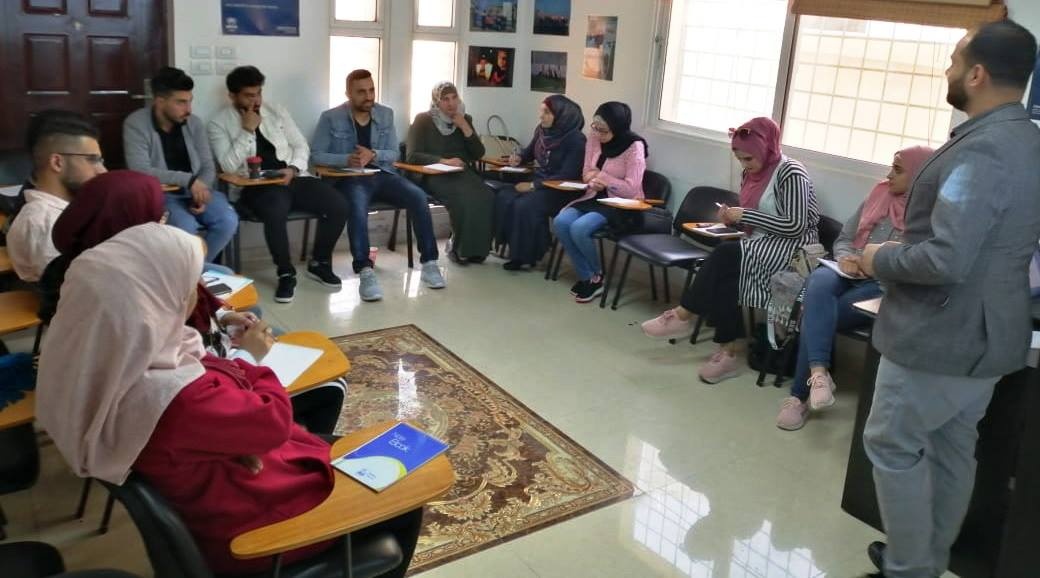The Arab Renaissance for Democracy and Development (ARDD) concluded the “Hadaf” project implemented in partnership with the International Institute for Nonviolent Action (NOVACT), through a media campaign aiming at preventing the rise or spread of violent extremism. Focusing on youth and women, the project aimed at reinforcing non-state actors’ role in public policymaking and promoting societies’ resilience in the face of violent extremism.
The project, implemented over two years in East Amman, Karak, Mafraq, and Zarqa, carried out several activities that ensured youth and women’s participation in activating intellectual and cultural dialogue within Al-Nahda forums and emphasizing the values of democracy, social participation, and human rights-based approach to promote social peace and solidarity. Another dimension entailed developing the capacities of Jordanian civil society organizations and developing a participatory work plan for the Jordanian community to prevent all forms of violent extremism. The project was implemented in collaboration with the members of the Steering Committee of the Observatory for the Prevention of Violent Extremism (OPEV) and civil society organizations from around the country, which highlighted the importance of solidarity and collaboration of civil society, government, and the media.
The media campaign was launched as part of the 16 Days of Activism against Gender-based Violence and in support of the efforts of the Observatory for the Prevention of Violent Extremism; it was carried out in collaboration with the International Institute for Nonviolent Action (NOVACT). The campaign aimed at raising awareness on the role of women, youth, media and legislation in combating violent extremism and promoting social peace; it had two main elements. One entailed launching several episodes of ARDD’s new program “Alarm Siren” that casts a light on the issues Arab communities are dealing with. To enrich the content and emphasize the value of women, youth, media and civil society in supporting the government effort to build resilient societies, the program based its episodes on several reports by ARDD, legal experts, legislators, activists, journalists, women and youth, and other partners.
A group of law and legislation experts took part in the episodes, such as Dr. Sawsan Al Majali, consultant at Durrat Almanal for Development and Training, Lawyer Leen Khayyat, lawyer and vice president of Jordanian Jurists Nour Al-Imam, and Dr. Abdullah Abu Zaid, legal expert in justice and security sectors. Representatives of the civil society also took part, such as Dr. Salma Nims, secretary-general of the Jordanian National Commission for Women (JNCW), Dr. Yusuf Mansur, director of Al-Nahda Thought Center at ARDD, members of JONAF, Fare’ Al-Masa’eed, president of Child Care Charity Association, Najah Oweidat, director of Al-Akiram Charitable Association for Families and Orphans, Esraa Mahadin, president of Karak Castle Center For Consultations and Training, and Asya Yaghi, president of “ I am Human” Society for the Rights of Persons with Disabilities.
Representing media and human rights activists were Samih al-Maaytah, former minister of media and information, Bassel Tarawneh, former governmental general coordinator for human rights, Mousa Al Saket, chairman of Hayat FM Radio, Nadine Al Nimri, journalist and human rights activist, Abdullah Jbour, researcher and writer specialized in extremist groups, and journalist Sahem Al Abadi.
The film “The Role of Legislations in Preventing Violent Extremism” first and second parts were shown during the campaign and explored the legal and legislative contribution to the prevention of violent extremism and the importance of empowering children, youth and women to reach justice, while the film “Women’s Role in Preventing Violent Extremism” first and second parts shed light on the role of women in protecting themselves, their families and their communities from violence, the problems women face and the main causes of extremism that women themselves could contribute to.
A third film, titled “The Role of Youth, Media, and Government in Preventing Violent Extremism” tackled in its first and second parts the role of these actors in the prevention of extremism, youth’s perceived obstacles to preventing extremism, and the mechanisms for building trust among all actors to ensure the integrability of the prevention efforts.
Over 40 young people interested in social journalism participated in discussions around the films and in specialized media training that aimed at developing participants’ journalistic capacities, to enable them to convey the voices of their societies, pinpoint their role in finding solutions to social issues, and promote social peace and solidarity.
The second element of the campaign focused on presenting women’s role in the prevention of violent extremism through digital publishing of quotes by women leaders members in JONAF about their roles within the national agenda of Resolution 1325 on women, peace, and security, and building a safe and stable society.


